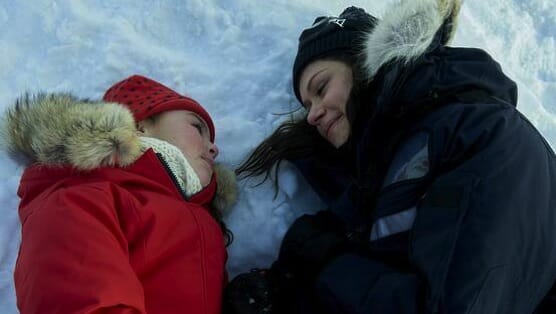Orphan Black: “History Yet to Be Written”
(Episode 3.10)

After nine entries of widely varying quality and plotlines both engaging and baffling, Orphan Black Season Three comes to an appropriately messy conclusion with “History Yet to Be Written.” Per Orphan Black tradition, some storylines are laid to rest whilst others duck back to fight another day. And while certainly satisfying in certain respects, the episode is not without the frustrating convolutions that have plagued much of this season.
Picking up from last week, Sarah, Siobhan and Felix have returned from London with original Leda/Castor mother Kendall Malone in tow. The woman proves to be as big a pill as one would expect with her constant complaining and general surliness. She even goes out of her way to tell Cosima that she is little more than a “bad copy” of her. Perhaps knowing the anger and frustration that comes with losing control of one’s body, Cosima responds with a sympathetic plea for help. It seems to do the trick and Kendall agrees to again be the test subject.
Moreover, as the episode begins, the sister-clones are preparing themselves for the oncoming forces—Virginia, Rudy and their militia on one end and the sleazy Ferdinand and Topside on the other. The gang eventually settles on a solution. First they strike a deal with Ferdinand to provide some of Kendall’s genetic material.
Meanwhile, knowing Virginia and Rudy’s MO, Sarah and Co. design two traps for them. One, they lead Virginia to believe she has Kendall’s location, only to send them to a Topside-dominated area where they are easily outnumbered. Secondly, given that Alison has long been considered the group’s “weak flank,” they arrange it so that Rudy, in an attempt to abduct Alison, ends up walking straight into a confrontation with Helena.
The latter idea leads to what can most easily be classified as a season climax—the showdown between a Castor and Leda clone. Unfortunately, given that Rudy’s body has been shutting down throughout the whole episode, we know from the beginning that he has little chance against someone who we saw massacre an entire gang last episode. As such, there’s not a whole lot of inherent suspense here. Nevertheless there is a sense of catharsis when a dying Rudy tries to draw a comparison between him and Helena, only for Helena to softly call him out on his excuse by pointing out that he is, for all intents and purposes, a rapist.
And so, unless the writers decide to either have Mark live on for longer than his allotted lifespan would allow, or introduce more clones in subsequent seasons, Rudy’s death seems to basically spell the end of the Castor plotline. Honestly, it’s probably for the best. Much of the season’s early foibles are tied to this plotline and all the screentime devoted to establishing this new breed of clones. I won’t say Ari Millen wasn’t an effective bad guy at times, he certainly was, but the Castor clones were simply never given the shading that made them feel like worthy adversaries. In the end, the Castor experiment only served to make an already confounding show all the more confounding.
However, and speaking of confounding, nothing in the hour can quite touch the finale’s “big” reveal. As the group begins the process of giving Kendall’s blood to Topside, Delphine ends up in conversation with Dyad doctor Nealon who unveils yet another layer to the show’s already padded conspiracy plotline. Apparently, Neolution, the movement spearheaded by Dr. Aldous Leekie way back in Season One, is the driving force behind everything that has happened in the show. What’s more, they plan on using Topside as a means of gaining Kendall’s genetic makeup for nefarious purposes. Nealon also shows that the group is holding Rachel captive and has given her a new mechanical eye (thus, ditzy clone Krystal made it through with both eyes intact). Nealon makes a final offer to Delphine to join their ranks but Delphine refuses. Then, in one of the most baffling scenes of the night, the doctor announces she’ll be “dead by morning” and proceeds to attack her while what appears to be some kind of mechanical worm emerges from his mouth, seemingly looking to infect her. I think that’s what happened, but I’m not exactly sure. Again, this is one of the more prominent examples of some weird element being introduced into the show at the last minute that confuses more than it intrigues.
-

-

-

-

-

-

-

-

-

-

-

-

-

-

-

-

-

-

-

-

-

-

-

-

-

-

-

-

-

-

-

-

-

-

-

-

-

-

-

-








































